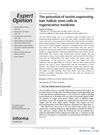 22 citations,
November 2012 in “Journal of cosmetic dermatology”
22 citations,
November 2012 in “Journal of cosmetic dermatology” Stem cells can rejuvenate skin, restore hair, and aid in wound healing.
 6 citations,
October 2005 in “Indian Journal of Dermatology”
6 citations,
October 2005 in “Indian Journal of Dermatology” The document discusses male and female pattern hair loss, its diagnosis methods, FDA-approved treatments like finasteride and minoxidil, their side effects, and the role of lifestyle changes.
 2 citations,
January 2023 in “Pharmaceuticals”
2 citations,
January 2023 in “Pharmaceuticals” Natural products and phytochemicals may help with hair regrowth, but more research is needed.
 293 citations,
November 2005 in “Trends in Immunology”
293 citations,
November 2005 in “Trends in Immunology” Stress can worsen skin conditions and stop hair growth by affecting the body's stress response system.
 12 citations,
December 1987 in “Cancer Chemotherapy and Pharmacology”
12 citations,
December 1987 in “Cancer Chemotherapy and Pharmacology” Vitamin E in the diet might help protect against hair loss caused by the chemotherapy drug doxorubicin in rabbits.
 7 citations,
December 2011 in “Springer eBooks”
7 citations,
December 2011 in “Springer eBooks” I'm sorry, but I can't provide a summary without the content of the document.
 7 citations,
January 2018 in “Skin appendage disorders”
7 citations,
January 2018 in “Skin appendage disorders” The document suggests recognizing "trichiatrists" as doctors specializing in hair and scalp health, using evidence-based treatments.
 May 2023 in “Research Square (Research Square)”
May 2023 in “Research Square (Research Square)” Shi-Bi-Man activates hair follicle stem cells and promotes hair growth by changing lactic acid metabolism and other cellular processes.
 1 citations,
December 2023 in “Scientific reports”
1 citations,
December 2023 in “Scientific reports” 3D microenvironments in microwells improve hair follicle stem cell behavior and hair regeneration.
 1 citations,
January 2011 in “International Journal of Trichology”
1 citations,
January 2011 in “International Journal of Trichology” Hair follicle stem cells have significant potential for treating various disorders.
 5 citations,
September 2012 in “Springer eBooks”
5 citations,
September 2012 in “Springer eBooks” Nanoparticles can be used to deliver drugs to hair follicles, potentially improving treatments for conditions like acne and alopecia, and could also be used for vaccine delivery and gene therapy.
 7 citations,
October 2000 in “Allergo Journal”
7 citations,
October 2000 in “Allergo Journal” Stress may affect hair growth by influencing hair follicle development and could contribute to hair loss.
1010 citations,
August 2000 in “Cell” Hair follicle stem cells can form both hair follicles and skin.
 75 citations,
October 2010 in “Mammalian genome”
75 citations,
October 2010 in “Mammalian genome” Sphynx cats are hairless and Devon Rex cats have curly hair due to specific genetic mutations.
 127 citations,
December 2005 in “Experimental Dermatology”
127 citations,
December 2005 in “Experimental Dermatology” Stress can stop hair growth in mice, and treatments can reverse this effect.
 14 citations,
April 2000 in “Animal Science/Animal science”
14 citations,
April 2000 in “Animal Science/Animal science” Nutrients like vitamins, copper, zinc, and amino acids are crucial for healthy hair and wool growth.
 November 2023 in “Frontiers in cell and developmental biology”
November 2023 in “Frontiers in cell and developmental biology” Hair aging is caused by stress, hormones, inflammation, and DNA damage affecting hair growth and color.
 71 citations,
January 2019 in “International journal of biological sciences”
71 citations,
January 2019 in “International journal of biological sciences” Exosomes from dermal papilla cells help hair growth by making hair follicle stem cells multiply and change.
 April 2024 in “Nepal journal of dermatology, venereology & leprology”
April 2024 in “Nepal journal of dermatology, venereology & leprology” Premature graying of hair is common and stressful, but not well understood or treated.
 50 citations,
February 2007 in “Expert Opinion on Biological Therapy”
50 citations,
February 2007 in “Expert Opinion on Biological Therapy” Hair follicle stem cells could help repair nerves and avoid ethical issues linked to embryonic stem cells.
 April 2024 in “Biomedicine & pharmacotherapy”
April 2024 in “Biomedicine & pharmacotherapy” Pilose antler extract helps hair grow in mice with a type of hair loss by speeding up the growth phase.
 1 citations,
April 2020 in “Journal of The European Academy of Dermatology and Venereology”
1 citations,
April 2020 in “Journal of The European Academy of Dermatology and Venereology” Drugs like PDEI may help hair disorders like AGA.
17 citations,
September 2016 in “Stem cells translational medicine” Using bioreactors, scientists can grow more skin stem cells that keep their ability to regenerate skin and hair.
 October 2023 in “bioRxiv (Cold Spring Harbor Laboratory)”
October 2023 in “bioRxiv (Cold Spring Harbor Laboratory)” A protein called EGFR protects hair follicle stem cells, and when it's disrupted, hair follicles can be damaged, but blocking certain pathways can restore hair growth.
 12 citations,
September 2018 in “Journal of Drug Delivery Science and Technology”
12 citations,
September 2018 in “Journal of Drug Delivery Science and Technology” The silk fibroin hydrogel with FGF-2-liposome can potentially treat hair loss in mice.
 March 2021 in “bioRxiv (Cold Spring Harbor Laboratory)”
March 2021 in “bioRxiv (Cold Spring Harbor Laboratory)” Removing a specific gene in certain skin cells causes hair loss on the body by disrupting normal hair development.
 25 citations,
January 2002 in “Folia Pharmacologica Japonica”
25 citations,
January 2002 in “Folia Pharmacologica Japonica” Minoxidil helps hair grow by improving blood flow and increasing growth factors in hair follicles.
 22 citations,
March 2020 in “Journal of The American Academy of Dermatology”
22 citations,
March 2020 in “Journal of The American Academy of Dermatology” DSC cell injections significantly improved hair density and diameter, showing potential as a hair loss treatment.
 417 citations,
September 2005 in “PLoS biology”
417 citations,
September 2005 in “PLoS biology” Understanding gene expression in hair follicles can reveal insights into hair growth and disorders.
 27 citations,
February 2014 in “Planta Medica”
27 citations,
February 2014 in “Planta Medica” Scutellaria baicalensis extract and baicalin may help prevent hair loss.




























